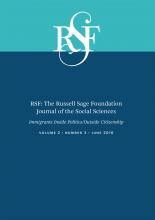Research ArticleIII. Political Participation and Partisanship
Open Access
Political Identity Convergence: On Being Latino, Becoming a Democrat, and Getting Active
Leonie Huddy, Lilliana Mason, S. Nechama Horwitz
RSF: The Russell Sage Foundation Journal of the Social Sciences June 2016, 2 (3) 205-228; DOI: https://doi.org/10.7758/RSF.2016.2.3.11
Leonie Huddy
aProfessor of political science at Stony Brook University
Lilliana Mason
bAssistant professor of government and politics at the University of Maryland, College Park
S. Nechama Horwitz
cDoctoral student in political science at Stony Brook University

REFERENCES
- ↵
- Abramson, Paul R., and
- John H. Aldrich
- ↵
- Alvarez, R. Michael, and
- Lisa García Bedolla
- American National Election Studies (ANES). 2008. The ANES Cumulative File dataset. Ann Arbor: University of Michigan; Palo Alto: Stanford University.
- ↵American National Election Studies (ANES). 2012. The ANES 2012 Time Series Study dataset. Ann Arbor: University of Michigan; Palo Alto: Stanford University. Accessed February 26, 2016. http://www.electionstudies.org/.
- ↵
- Bowler, Shaun,
- Stephen P. Nicholson, , and
- Gary M. Segura
- ↵Bowler, Shaun, and Gary Segura. 2011. The Future Is Ours: Minority Politics, Political Behavior, and the Multiracial Era of American Politics. Thousand Oaks, Calif.: CQ Press.
- Brader, Ted,
- Joshua A. Tucker, , and
- Andrew Therriault
- ↵Campbell, Angus, Philip E. Converse, Warren E. Miller, and Donald E. Stokes. 1960. The American Voter. New York: John Wiley & Sons.
- ↵Dawson, Michael C. 1994. Behind the Mule: Race and Class in African-American Politics. Princeton, N.J.: Princeton University Press.
- ↵Fiorina, Morris P. 1981. Retrospective Voting in American National Elections: A Micro-Analysis. New Haven, Conn.: Yale University Press.
- ↵
- Franklin, Charles H., and
- John E. Jackson
- ↵Garcia, John A. 2011. Latino Politics in America: Community, Culture, and Interests. Lanham, Md.: Rowman & Littlefield.
- ↵
- Groenendyk, Eric W., and
- Antoine J. Banks
- ↵
- ↵Huddy, Leonie. 2013. “From Group Identity to Political Commitment and Cohesion.” In Oxford Handbook of Political Psychology, edited by Leonie Huddy, David O. Sears, and Robert Jervis. New York: Oxford University Press.
- ↵
- Huddy, Leonie, and
- Tony E. Carey Jr.
- ↵
- ↵
- Iyengar, Shanto,
- Gaurav Sood, , and
- Yphtach Lelkes
- ↵Lazarsfeld, Paul, Bernard Berelson, and Hazel Gaudet. 1944. The People's Choice. New York: Columbia University Press.
- ↵Levendusky, Matthew. 2009. The Partisan Sort: How Liberals Became Democrats and Conservatives Became Republicans. Chicago: University of Chicago Press.
- ↵Lipset, Seymour Martin. 1960. Political Man: The Social Bases of Politics. Garden City, N.J.: Doubleday.
- ↵Marcus, George E., W. Russell Neuman, and Michael Mackuen. 2000. Affective Intelligence and Political Judgment. Chicago: University of Chicago Press.
- ↵
- Mason, Lilliana. Forthcoming. “A Cross-Cutting Calm: How Social Sorting Drives Affective Polarization.” Public Opinion Quarterly.
- McCann, James A., and Michael Jones-Correa. 2012. Latino Immigrant National Election Study, 2012. New York: Russell Sage Foundation, Carnegie Corporation of New York, Purdue University, and Cornell University.
- ↵
- Mutz, Diana C
- ↵New York Times. 2008. “Election Results 2008.” Accessed October 14, 2014. http://elections.nytimes.com/2008/results/president/exit-polls.html.
- ↵New York Times. 2012. “President Exit Polls.” Accessed October 14, 2014. http://elections.nytimes.com/2012/results/president/exit-polls.
- ↵Nordlinger, Eric. 1972. Conflict Regulation in Divided Societies. Cambridge, Mass.: Harvard University Center for International Affairs.
- ↵
- Philpot, Tasha S., and
- Hanes Walton
- ↵
- ↵
- Reese, Laura A., and
- Rupert E. Brown
- ↵
- Roccas, Sonia, and
- Marilynn B. Brewer
- ↵Rosenstone, Steven, and John Hansen. 1993. Mobilization, Participation, and Democracy in America. New York: MacMillan.
- ↵
- Schmid, Karin,
- Nicole Tausch, ,
- Miles Hewstone, ,
- Joanne Hughes, , and
- Ed Cairns
- ↵
- Sigelman, Lee, and
- Susan Welch
- ↵
- Smith, Heather J.,
- Tracey Cronin, , and
- Thomas Kessler
- ↵Tajfel, Henri. 1981. Human Groups and Social Categories: Studies in Social Psychology. Cambridge: Cambridge University Press.
- ↵Tajfel, Henri, and John Turner. 1979. “An Integrative Theory of Intergroup Conflict.” In The Social Psychology of Intergroup Relations, edited by William G. Austin and Stephen Worchel. Monterey, Calif.: Brooks/Cole.
- ↵Tate, Katherine. 1994. From Protest to Politics: The New Black Voters in American Elections. Cambridge, Mass.: Harvard University Press.
- Taylor, Paul, Ana Gonzalez-Barrera, Jeffrey S. Passel, and Mark Hugo Lopez. 2013. “An Awakened Giant: The Hispanic Electorate Is Likely to Double by 2030.” Washington, D.C.: Pew Hispanic Center. Accessed February 1, 2016. http://www.pewhispanic.org/2012/11/14/an-awakened-giant-the-hispanic-electorate-is-likely-to-double-by-2030/.
- ↵Turner, John, Michael Hogg, Penelope Oakes, Stephen Reicher, and Margaret Wetherell. 1987. Rediscovering the Social Group: A Self-Categorization Theory. Oxford: Blackwell.
- ↵Uhlaner, Carole J., and F. Chris Garcia. 1998. “Foundations of Latino Party Identification: Learning, Ethnicity and Demographic Factors among Mexicans, Puerto Ricans, Cubans and Anglos in the United States.” Irvine: University of California, Center for the Study of Democracy. Accessed February 1, 2016. http://escholarship.org/uc/item/3qq4v57p.
- U.S. Census Bureau. 2012. Current Population Survey dataset, November 2012. Washington: Government Printing Office.
- ↵
- ↵
- ↵
In this issue
Political Identity Convergence: On Being Latino, Becoming a Democrat, and Getting Active
Leonie Huddy, Lilliana Mason, S. Nechama Horwitz
RSF: The Russell Sage Foundation Journal of the Social Sciences Jun 2016, 2 (3) 205-228; DOI: 10.7758/RSF.2016.2.3.11
Jump to section
Related Articles
- No related articles found.
Cited By...
- No citing articles found.





